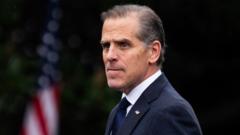As the U.S. threatens new tariffs, Canada remains resolute in seeking a fair trade deal, with potential protective measures hinted at for its key industries.
Canada's Prime Minister Vows to Reject 'Bad Deal' Amid U.S. Tariff Threats

Canada's Prime Minister Vows to Reject 'Bad Deal' Amid U.S. Tariff Threats
Mark Carney emphasizes the importance of securing a beneficial trade agreement with the U.S., standing firm against unfavorable terms as deadline approaches.
Canadian Prime Minister Mark Carney made it clear this week that Canada will not accept a "bad deal" in negotiations regarding U.S. tariffs, as the 1 August deadline nears for potential new U.S. tariffs on Canadian goods. In a press briefing in Ontario, Carney emphasized, "Our objective is not to reach a deal whatever it costs," signaling Canada's intent to secure a trade agreement that benefits its citizens.
U.S. importers may face a hefty 35% tariff on Canadian goods if the countries fail to strike a deal before the stipulated deadline. The two nations are major trading partners, but tensions have escalated since President Donald Trump resumed office with an aggressive tariff agenda aimed at revitalizing American manufacturing and protecting domestic jobs. Critics, however, have cautioned that such tariffs could lead to increased prices for U.S. consumers and disrupt the global economy.
Currently, Trump has already instigated a 25% tariff on selected Canadian imports, alongside a staggering 50% tax on aluminum and steel products. In response to these threats, Carney indicated the potential for protective actions for crucial Canadian sectors, including aluminum and lumber, possibly hinting at the introduction of further protectionist measures as U.S. tariffs begin impacting the Canadian economy.
Historically, Canada relies on the U.S. for about three-quarters of its goods exports, covering essential industries such as metal, lumber, oil, automobiles, and pharmaceuticals. According to recent statistics from the Office of the U.S. Trade Representative, in 2024, U.S. exports to Canada were valued at nearly $350 billion, contrasting with over $412 billion in imports from Canada.
Framed within a broader tariff policy targeting various nations, Trump attributes this aggressive stance to an assertion of perceived unfairness in international trade and to pressure neighboring nations to combat illegal fentanyl trafficking into the U.S. However, data suggests that a minimal percentage of fentanyl seizures occur at the U.S.-Canada border compared to the southern border with Mexico.
While Trump has pursued several tariff agreements internationally, these have often retained elevated rates. A recent deal with the Philippines, for instance, adjusted tariffs from an initial 17% to 19%, showcasing the ongoing complexities and negotiations surrounding U.S. trade policy.
U.S. importers may face a hefty 35% tariff on Canadian goods if the countries fail to strike a deal before the stipulated deadline. The two nations are major trading partners, but tensions have escalated since President Donald Trump resumed office with an aggressive tariff agenda aimed at revitalizing American manufacturing and protecting domestic jobs. Critics, however, have cautioned that such tariffs could lead to increased prices for U.S. consumers and disrupt the global economy.
Currently, Trump has already instigated a 25% tariff on selected Canadian imports, alongside a staggering 50% tax on aluminum and steel products. In response to these threats, Carney indicated the potential for protective actions for crucial Canadian sectors, including aluminum and lumber, possibly hinting at the introduction of further protectionist measures as U.S. tariffs begin impacting the Canadian economy.
Historically, Canada relies on the U.S. for about three-quarters of its goods exports, covering essential industries such as metal, lumber, oil, automobiles, and pharmaceuticals. According to recent statistics from the Office of the U.S. Trade Representative, in 2024, U.S. exports to Canada were valued at nearly $350 billion, contrasting with over $412 billion in imports from Canada.
Framed within a broader tariff policy targeting various nations, Trump attributes this aggressive stance to an assertion of perceived unfairness in international trade and to pressure neighboring nations to combat illegal fentanyl trafficking into the U.S. However, data suggests that a minimal percentage of fentanyl seizures occur at the U.S.-Canada border compared to the southern border with Mexico.
While Trump has pursued several tariff agreements internationally, these have often retained elevated rates. A recent deal with the Philippines, for instance, adjusted tariffs from an initial 17% to 19%, showcasing the ongoing complexities and negotiations surrounding U.S. trade policy.



















